Module 5
As I begin to write this assignment for module 5, I can’t believe the amount of learning I have done!! I have truly engaged more with Beyond Report Cards in a meaningful way than I have any other Professional Learning Community via Facebook before. I have been listening to the recommended podcasts, posting to the group, commenting on others posts, and reading recommended readings. I can’t say enough good things about this PLC I have joined. Beyond Report Cards has truly opened my eyes to not only the possibilities of gradeless reporting, but also the realities it has presented other educators in British Columbia with.
March 12
I started to look through the posts from the group and realized that moderator Shannon Schinkel has written some quality blog posts focused on promoting going gradeless. One article specifically caught my attention titled Stop Making Grade Soup (Schinkel, 2023.). I found this article interesting for a few reasons. Shannon discussed really important points about grades and how they can encourage teacher-centered assessment. One part I found really interesting from this article was that Shannon describes teachers starting with the standards of what students actually need to know before they move on to planning their lessons. Teachers must “understand and unpack these standards, and then co-construct criteria for each standard with their departmental colleagues, they will effectively be on the same page about what students are expected to know and do.” This was an interesting part of this article because it discusses the consideration of assessment in the planning stages. When the article moves on to the levels of assessment in the proficiency scale, Schinkel discusses scaffolding instruction to create access points for all learners to be able to meet the standards for grade level proficiency. Schinkel also discusses the importance of opportunities for ongoing feedback aligned with student progression. This article beautifully displays the interconnectedness between planning, instruction, and assessment. Schinkel promotes the proficiency scale for assessment rather than grades by providing reasoning based on not just the assessment stages, but also planning and instruction.
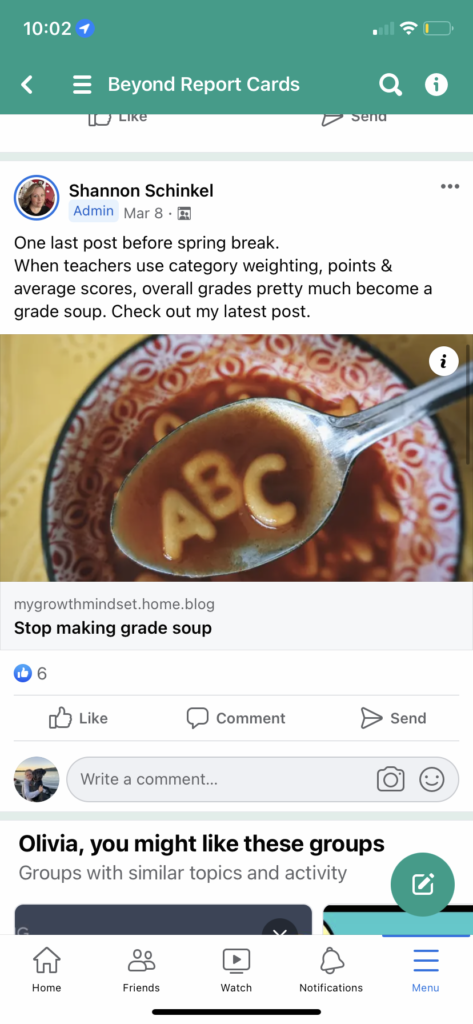
Another article that Shannon posted but didn’t write herself caught my attention. I decided to take a look at the article on another day and let the reading I did sink in a little more.
March 13
I revisited Beyond Report Cards to read Eat Better – Grilled Cheese vs. Standards and Rubrics written by Alex T. Valencic. This article was both informative and entertaining–especially because I LOVE grilled cheese. This article portrays the assessment process using the proficiency scale in an articulated and accurate format. The author describes the possibilities that are opened up by the flexibility of the proficiency scale while also not limiting learners by reducing them to a grade format of assessment. Reading this article was also a good reminder for me when it comes to developing rubrics. The author’s overall message was to “focus on the focus, not the fluff.” What this means is that during assessment, educators should avoid getting carried away with all of the extras, and examine whether or not the student achieved the standards required to accomplish the learning tasks, not focusing on extras that the student could have done.
I found some posters to help display the core competencies in my classroom. These posters are eye catching and help to promote the learner-centred design.
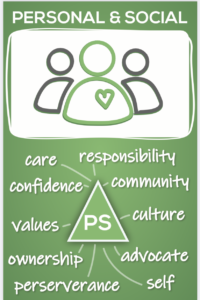
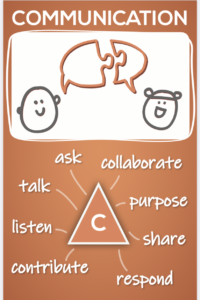
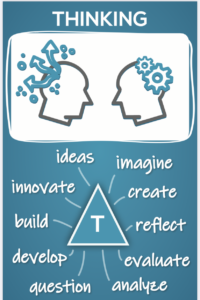
March 14
In the Cost of Not Changing podcast, Tim Stephenson articulates that there is a price to pay for not changing. The main takeaway I got from this podcast is that there will always be consequences. If you change, the consequences will be related whereas it is the same if you choose not to change. This reminds me of the statement “choose your hard” because it recognizes that nothing comes without consequences, however your choices direct what those consequences will be. I found this podcast to be relevant to what is going on in British Columbia with the new reporting order because all of my colleagues that are being asked to make a decision whether they will embrace the proficiency scale for all that is has to offer with assessment in British Columbia, or if they will continue to follow a grade based format that they just convert to gradeless with a system they have created on their own. This hasn’t been an easy change for many and in light of society still recovering from a pandemic, for many it seems like just yet another thing that our employer is asking of us. While I agree that the change just never stops coming, I think it is important to embrace this change because it truly portrays learning as just that, learning. There aren’t significant penalties for trivial things like lates and attendance issues. This process focuses on the learning that students are doing in a holistic way.
Rita Pierson’s video is one that I have actually seen before, but every time I watch it over, I gain something new from it. This time it was a reminder of why I love this profession and how there are so many things that make me a strong teacher.
Shannon Schinkel’s article Because We All Need Supports reminded me of a workshop I participated in during my bachelor of education studies. This workshop was taken with a principal in SD57, Katie Marren, who is also a yoga teacher. Katie asked us all to stand up in the theatre we were sitting in and do a yoga balance. Katie provided several differentiations for this pose and afterwards explained that everyone in the room could do it with the right supports. This was one of the first times I began to understand the power of the proficiency scale in promoting learning. Schinkel’s article reminds me of this and also helps me to connect to the Grilled Cheese article I read on March 13 which discusses on focusing on whether or not the student achieved the learning target even if they used some supports.
March 15
I put some thought in, and I created my first post. Once I actually hit “post”, I found out that this group moderates every single post before they become available to the group. I remembered seeing the moderator make a note on her last discussion post that it was her last one before spring break. I used to work in SD57 where the moderator works and remembered that their school district is off on break before we are, so I started to think “oh no”. I quickly started doing some looking around and found out that one of the other moderators was actually an instructor from the Bachelor of Education program at University of Northern British Columbia. I sent @Dr_Christine_Ho a message via facebook and asked her if she could post it since I knew she isn’t on the same vacation schedule as the public school district. She got back to me very quickly to let me know that she wasn’t able to approve the post as she is the secondary monitor and Shannon was the primary moderator. I settled on waiting and seeing whether or not I would get an approval message while she enjoys her vacation and moved on to looking at commenting on other members’ posts.
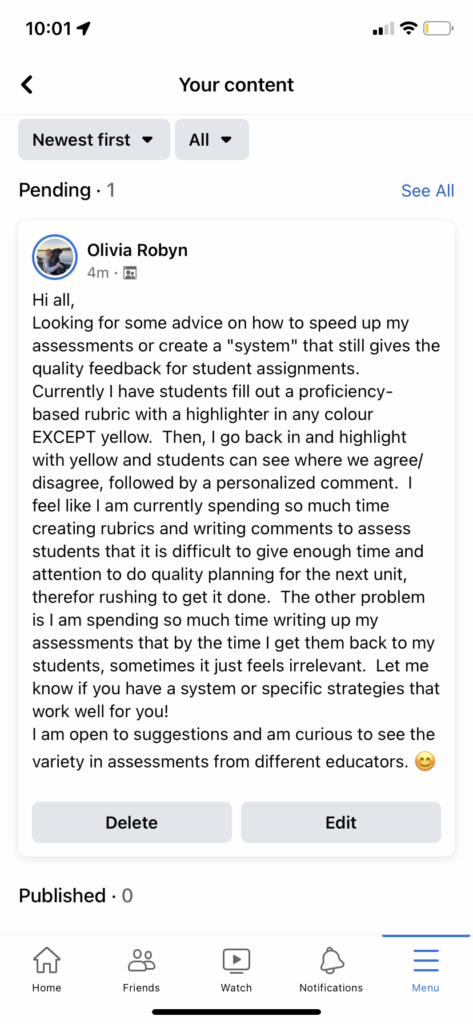
Reconnecting with Christine, the co-moderator of Beyond Report Cards was pretty neat for a few reasons. Christine was one of my references on my application for the Professional Masters of Education program through Queens, so it was neat to be able to share some of the learning I am participating in with her. This led me into sharing my website/blog which she actually was a part of helping me create during the EdTech course I took via her instruction in 2019. It was interesting to engage in PLC in this format as a bit of a stretched out connection from what my initial goal was.
I commented on Maria, another member’s, post about collaborating with the moderator, Shannon, to create a single point rubric. This was a rubric designed for the purpose of assessing a Science unit. I was a bit confused at first since I had interacted with a single point rubric, but was unsure how it would translate to the proficiency scale and formal reporting, which is what is used as a framework for gradeless reporting.
March 16
Response to my comment from March 15: I learned that Maria uses this more for formative assessment, rather than summative. This form of assessment is a snapshot, mid-unit, to inform both the student and teacher where the student is at. This form of assessment would inform the summative assessment, but NOT replace it.
I then commented back to ask about how Maria manages this in her classroom. I was really curious about time-management, as that is something I struggle to navigate in my classroom with assessments. I also wanted to know how the introduction to this form of assessment went with this member’s students. I find that when I introduce a new form of assessment to my students it often takes a few tries before we can work through the kinks of each assessment format due to it being brand new to them.
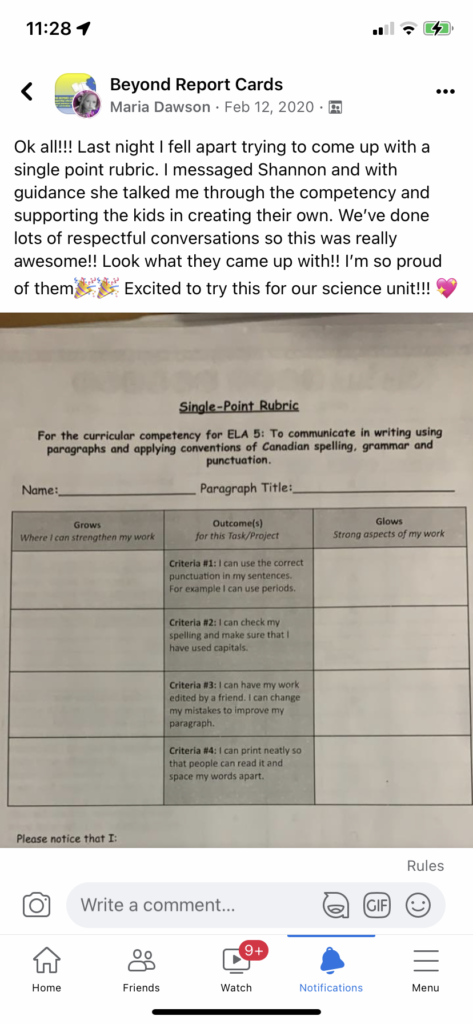
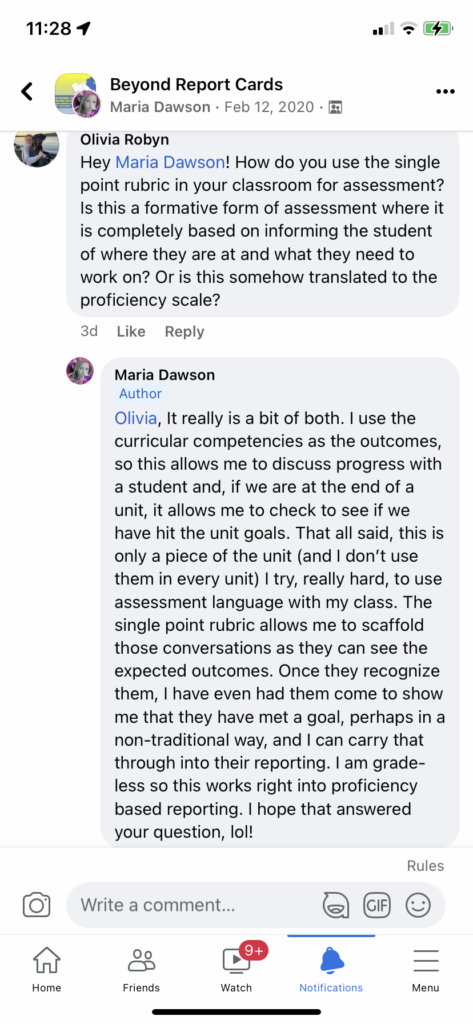
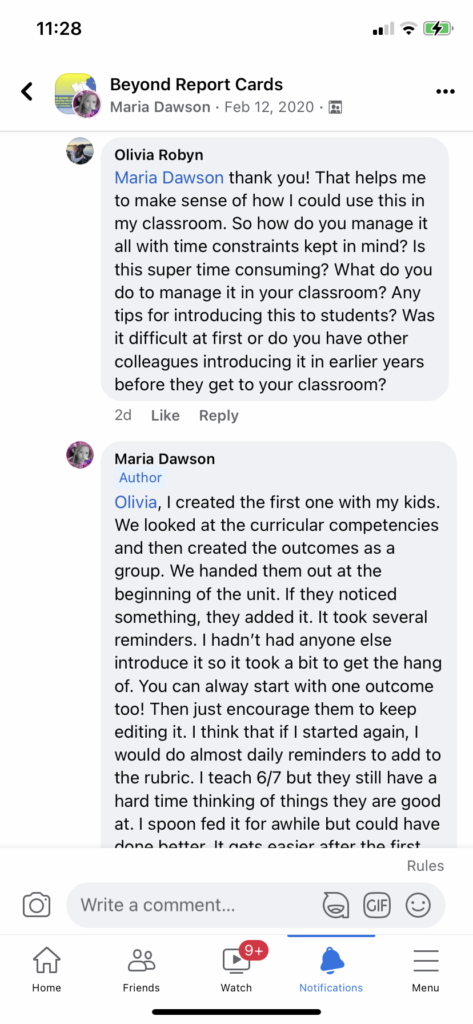
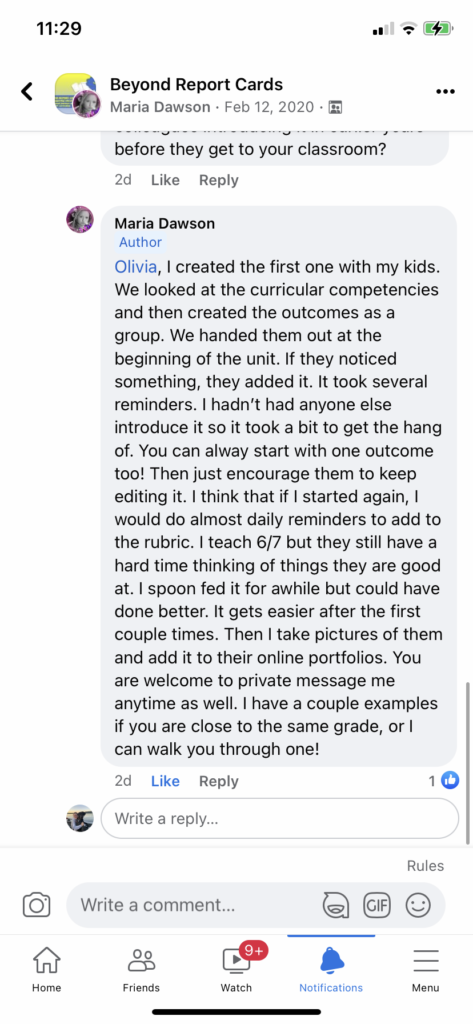
I found more clarity on single point rubrics by using the search bar for the Beyond Report Cards Facebook group. Shannon Schinkel had also posted some information detailing single point rubrics and their purpose.
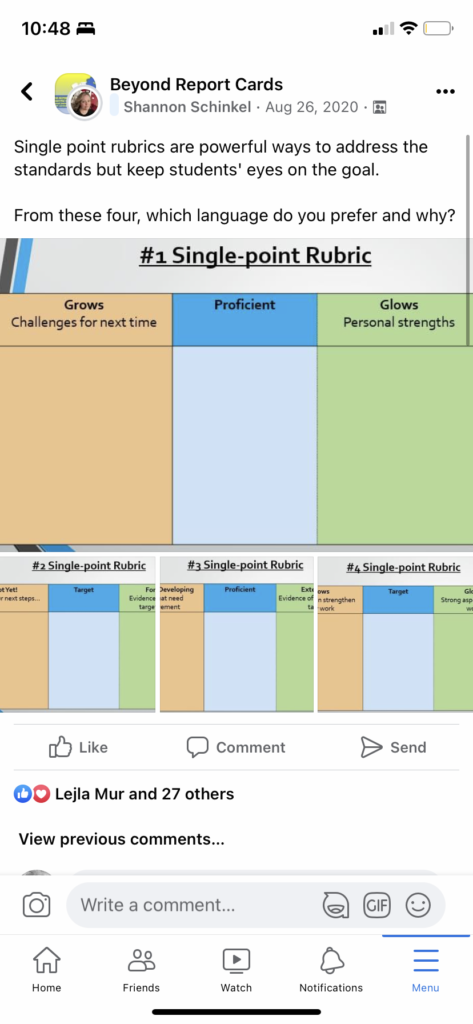
March 17
My post was approved to the page by the administrator and the discussion began. I had many people comment back to me responding to my thoughts about creating an efficient format of assessment while also continuing to consider the quality of assessment. I got a lot of feedback that is similar to what I had already thought about assessment and formative vs summative formats. My conclusion of my learning from this post is that instead of being so summative heavy, I am going to try formative heavy to avoid the end of the assignment crunch for lengthy assessments.
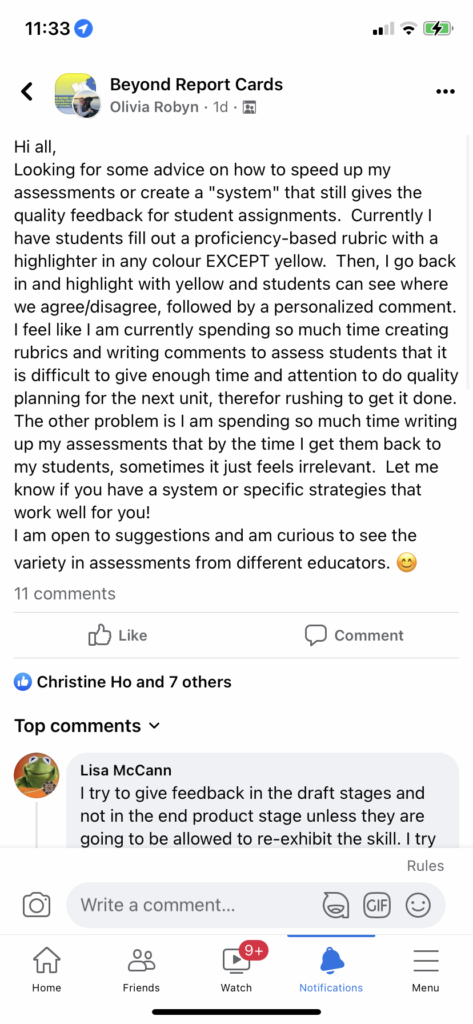
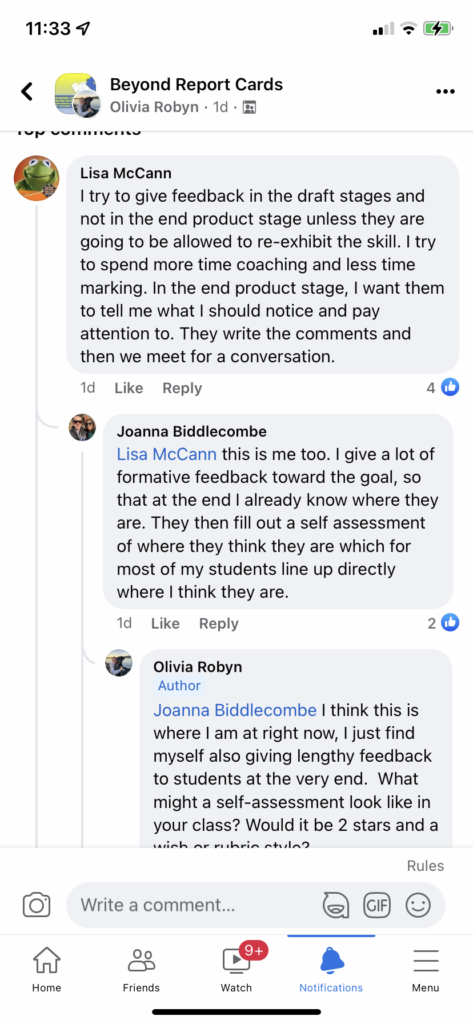
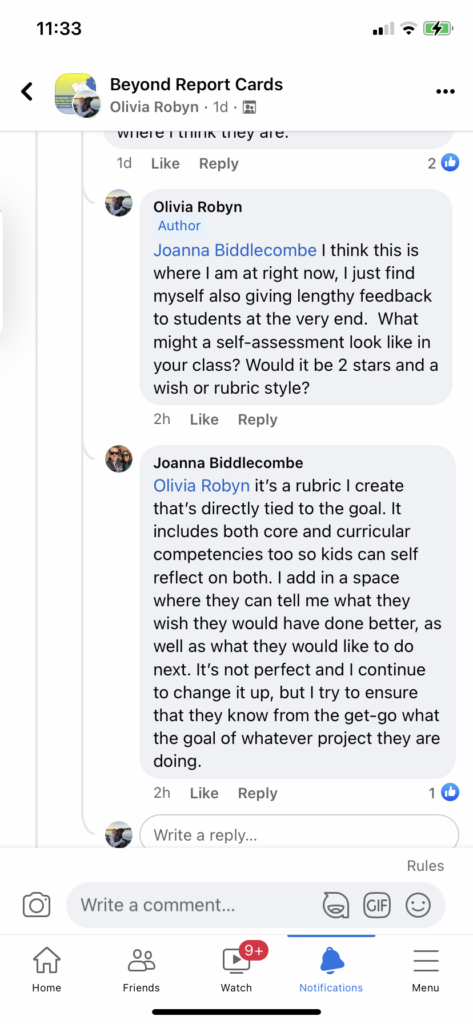
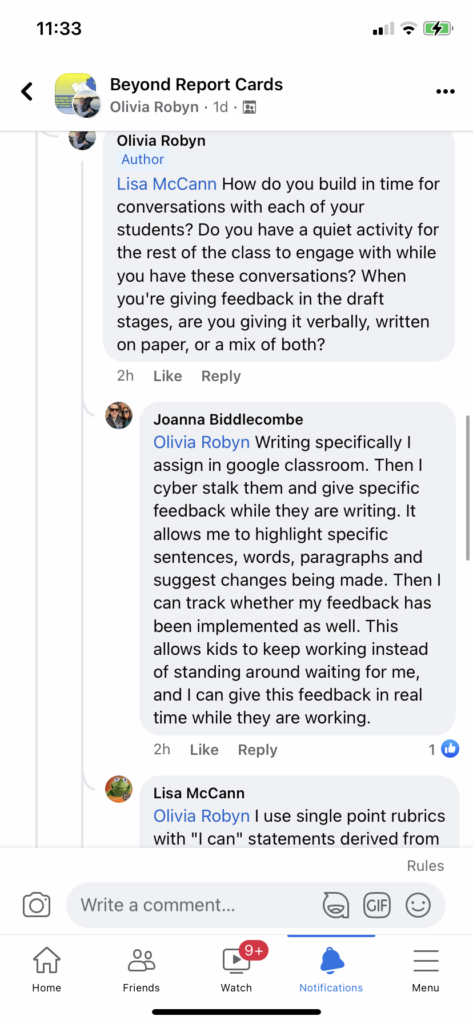
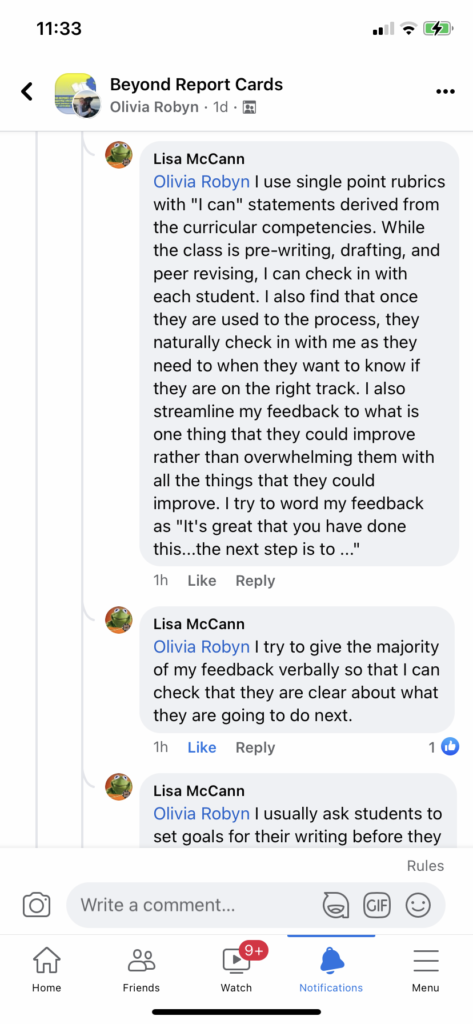
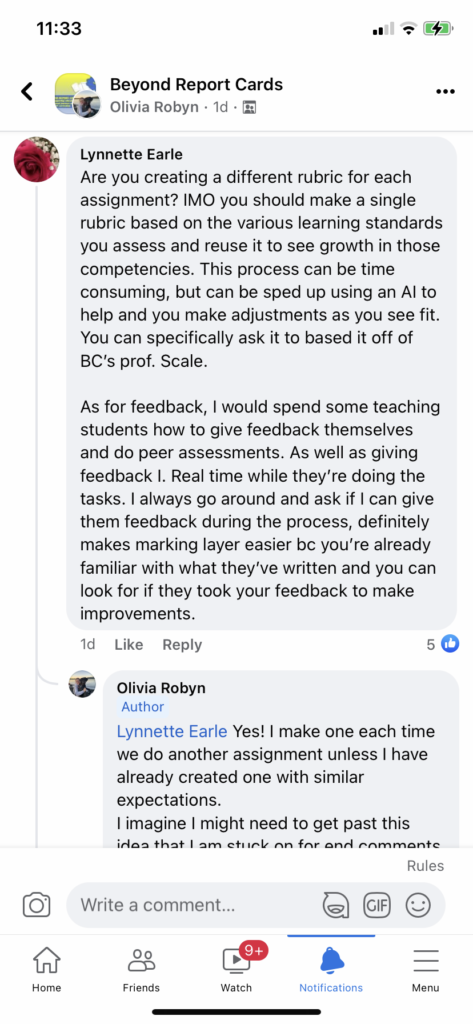
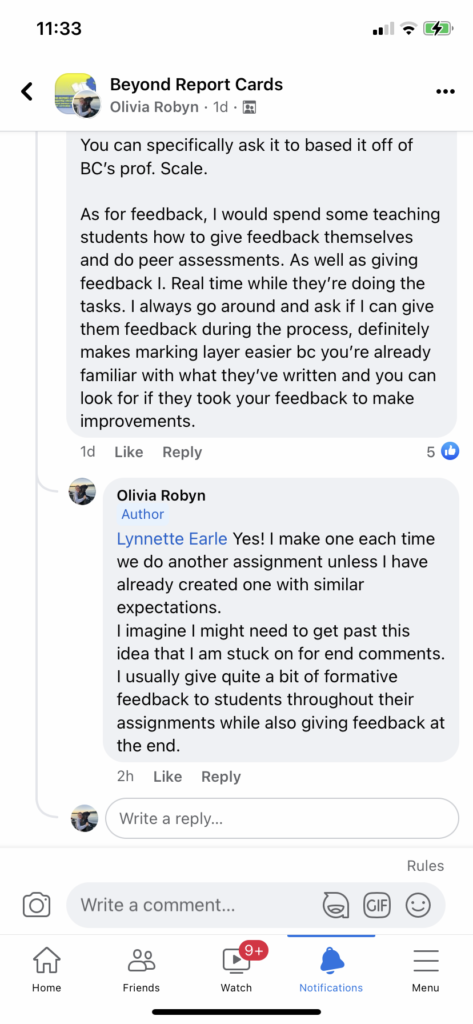
Over and over I continue to make mental connections between my philosophy in the classroom as an educator, the ministry of education’s push towards gradeless assessments as a province for K-9, and the learner-centered design that I studied via the mind map I created alongside Renata and Dzmitry during this course. There are so many similarities and trends that flow through all three. I truly believe that a learner centered approach is one that will not only help to personalize learning, but ensure that education continues to move towards truth and reconciliation.
Reflections:
The learning I participated in during this module heavily promoted the Learner Centered Design. British Columbia is on an intentional pathway of change with the new reporting order with some elements of the Problem Centered Design also being included. It is evident that while there is a lot of enthusiasm from certain members of the province, there are still many who are having a difficult time with this. I found this to be the most evident in my school district when I was engaging in non-instructional days focused on the new reporting order. Many people like Shannon Schinkel, the moderator of Beyond Report Cards, are working hard to help bridge the gap for those still struggling with the concepts. While there is push back against this format of assessment, it will promote a renewed sense of learner centered learning within classrooms and push educators to expand their practice.
I have a strong foundation in assessment from the learning that I have done prior and during this course. The learning I have done in this course has however developed my awareness and understanding of my pedagogy regarding planning, instruction, and assessment. The learning I have done in this course has challenged me to look at planning, instruction, and assessment with a focused lens regarding philosophy. By developing a better understanding of philosophies of curriculum and curriculum designs, I can visualize the interconnectedness of the planning, instruction and assessment process. I place a lot more value on the learner centered design in my own practice and have reignited my thought process surrounding each stage of teaching in the classroom. I have specifically thought a lot more about backwards planning and ongoing formative assessment especially after the discussion I participated in the Beyond Report Cards facebook group. I am considering placing more emphasis on formative assessment to help promote stronger student self assessment and avoid the lengthy summative assessment processes. Some of the best advice I got from the Beyond Report Cards facebook group was that the formative assessment is much more impactful and meaningful because it is in real time delivery while also informing the learner to avoid surprise at the time of summative assessment. This also helps to mold the instructional process as it is wrapped within. Instruction will become increasingly impactful and useful to students using these methods.
This course, and even this final module, took me on a unique learning pathway that was different from what I have experienced throughout this whole program. I was connecting with my colleagues at work in the lunchroom about what kind of learning I was participating in as well as giving them a verbal play by play of the progress I was making throughout this course. I connected with colleagues from past programs that I was a part of as well as other members of the school district I work for via the Beyond Report Cards facebook page. The connections I made throughout this course are unique and I am grateful for them. I learned a lot from the other members of Beyond Report Cards and I can’t help but feel really lucky that I landed in a group that is so open with advice and supportive of others. I was nervous to post my thoughts in the beginning as I felt a bit vulnerable, but I was met with people genuinely wanting to give helpful and impactful feedback and advice. I was worried about my post being approved for this assignment due to the moderator being on spring break. What I found from that block in this activity was that I was motivated to find other ways to participate in this Professional Learning Community that were meaningful to me as an educator.
I want to take a moment to thank everyone who participated in my learning during both this course, and this final module. I have had various levels of impact of my learning from colleagues, classmates, and other educational professionals via Professional Learning Communities online. I could not have done it without everyone involved. A special shoutout goes to my group members from this course, Renata and Dzmitry, who worked very hard to coordinate schedules and meetings with me while juggling the time difference factor. The learning that has taken place during this course is unmatched.
Shannon Schinkel
April 22, 2023 — 5:13 pm
I am THRILLED you are finding so much valuable information on BRC! I truly believe we are so powerful as a community of learners which is why I started the group. I loved reading these two blog posts of yours and thank you for your beautiful and amplifying words about my blog. Keep it up, friend.